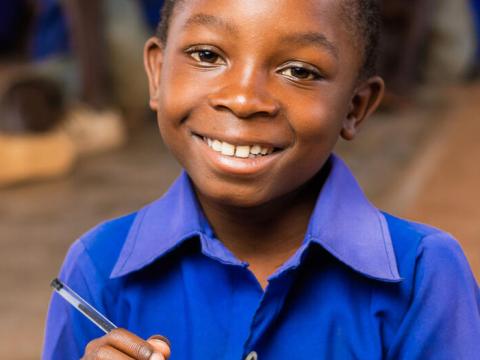Raising Phillip, the aspiring teacher in Malawi

Asiyileni dropped out of secondary school because her parents could not afford to pay for her school fees. Despite working hard on their farm where they produced maize, her family did not earn enough to make a living.
"My parents were poor farmers. We struggled a lot financially, so as soon as I completed my Junior Certificate examinations, I made the tough decision to drop out of school,” recalls Asiyileni.
Though she passed her exams, Asiyileni finally dropped out in 2004 and chose marriage as an escape route. None of her siblings went on to complete their secondary education.
“Our parents could not afford the fees. We missed a lot of school days, and I was sent out of the classroom many times for not paying fees. I was afraid it was going to be the same thing if I stayed on,” recalls Asiyileni, who married Steven in 2005.

The pain of dropping out of school is still raw for Asiyileni, who is now the mother of four children. Having failed to pursue an education herself, Asiyileni has been working hard to ensure her children take a different path to hers.
Through different farming interventions by World Vision Malawi, Asiyileni and her family have their eyes set on improving their income through a mix of different small-scale technologies, like irrigation.
“World Vision has been pushing us to improve on our farming,” says Asiyileni as she sits with her son Phillip. “We have been working hard in the garden where we produce maize, beans and pigeon peas for home use and to sell, so that our children can be healthy as well as have all they need for school and a better future,” she continues.
While Asiyileni is determined that her children will get an education through her savings, the pandemic has threatened the future.

How COVID-19 threatened their dreams
When COVID-19 hit Malawi early in 2020, life changed for the worse. The local market where they sell their produce was often closed. As her family business and farming struggled, the odds seemed against her children and Asiyileni was afraid of the past repeating itself.
“Schools were closed on 20 March, 2020, and my children were all home. I was afraid that they’d be out of school for a long time and possibly miss out on their education,” she says.
According to UNESCO data, at the peak COVID-19 crisis, over 1.6 billion learners in more than 190 countries were out of school.
Vulnerable and marginalised learners, like Asiyileni’s children, were hit the hardest.
While efforts were made to provide online lessons, more than 60 percent of primary and secondary school learners in Malawi, did not have access to remote learning resources during school closures.

World Vision steps in to help
As Asiyileni’s fears of her children missing out on education grew, World Vision Malawi stepped in.
Afraid of deepened inequalities in the education sector, they innovated to work with parents to ensure that children, especially those from rural areas, could continue learning and developing academically from their homes.
“We organised home schooling to ensure that parents and guardians could be helping their children read and write right in their homes,” says Thandeka Nkhonde, World Vision’s Manager for education interventions in Malawi.
Asiyileni and 99 other parents from her village went through the training.
“The only thing that could take away& my personal pain of failure is ensuring that my children perform well and complete their educations, so I embraced the Home-Schooling initiative and got more invested in Phillip’s education,” explains Asiyileni.
Soon after the Home-Schooling training, Asiyileni started giving extra lessons to her nine-year-old son, Phillip and his friends.

Children improving together
“When my mother started teaching, I started performing better and my friends began approaching me for assistance, so they could catch up on the lessons they were struggling with,” says Phillip, who aspires to be a teacher when he grows up.
Eventually, Phillip became his friends’ teacher.
“Learning from Phillip is easier because we are also friends,” says Joster.

According to Walusa Namaona,a teacher at Phillip’s school, learning from peers at home is a fun, worthwhile experience that draws the children’s attention.
In their community alone, World Vision has trained 603 guardians who are helping 1,394 children learn from home.
Across the country, World Vision is implementing the Home-Schooling initiative in six Area Programmes. So far, 10,811 children from 42 primary schools are being instructed at home.